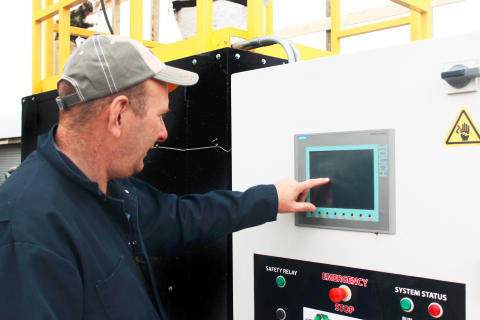Global Re-Fuels warm-air biomass furnace – now in use on a farm in Texas – converts raw poultry litter into energy, providing heat to broiler houses while creating a pathogen-free organic fertilizer.
Energy Technology Company Global Re-Fuel to Significantly Impact Poultry Industry with Cost-Effective Warm-air Biomass Furnace
Global Re-Fuel | Global Re-Fuel
Global Re-Fuel is an energy technology company that is poised to make a significant impact on poultry farming. Its PLF-500 biomass furnace offers a pioneering farm technology that addresses financial, health and environmental issues facing the agriculture industry.

Global Re-Fuel's patented PLF-500 warm-air biomass furnace converts raw poultry litter to energy.
Global Re-Fuel’s warm-air biomass furnace – now in use on a farm in Texas – converts raw poultry litter into energy, providing heat to broiler houses while creating a pathogen-free organic fertilizer.
“A ton of litter has the equivalent energy content of 67 gallons of propane. Extracting that heat and using the ash as fertilizer is a really good situation, which not only helps farmers, but is also beneficial to the environment,” says Glenn Rodes, a farmer who has used the technology on his Virginia poultry farm.
As the number of poultry operations in the U.S. increases, so do the attendant problems. Today, there are more than 110,000 broiler houses in the country, with that number expected to exceed 131,000 by 2024, according to U.S. Department of Agriculture (USDA) growth projections of the industry. More than 32 billion pounds of poultry litter were generated in 2015. That number is expected to grow to more than 37 billion pounds per year by 2024, which will exacerbate the soil nutrient overload that contributes to runoff pollution into US waterways.
In addition, poultry farms require a great deal of propane to heat broiler houses, with the average broiler house using about 6,000 gallons of propane each year. In 2015, more than 8.5 million tons of CO2 were emitted from burning propane to heat broiler houses, and that number is projected to grow to almost 10 million tons by 2024, according to the USDA. Global Re-Fuel’s technology eliminates nearly 100 percent of propane usage, reducing CO2 emissions by more than 70,000 lbs/yr/house.
“The Global Re-Fuel PLF-500 increases farmers’ operating margins, decreases pollution, eliminates propane usage – which reduces CO2 emissions – and improves poultry living conditions,” says Rocky Irvin, a founding member of Global Re-Fuel and a poultry grower for more than 10 years. “It’s good for the family farm and the environment.”
About Global Re-Fuel
Global Re-Fuel is an energy technology company focusing on solutions that address environmental issues facing the agriculture industry. Its patented PLF-500 warm-air biomass furnace converts raw poultry litter to energy, providing heat to broiler houses while creating a pathogen-free organic fertilizer. This emerging technology helps solve the ever-increasing nutrient overload and runoff problems near livestock concentrations, reduces CO2 emissions by more than 70,000 lbs/yr/house, increases farmers’ operating margins and improves poultry living conditions. For more information, please visit www.globalrefuel.com/.
The content & opinions in this article are the author’s and do not necessarily represent the views of AgriTechTomorrow
Comments (0)
This post does not have any comments. Be the first to leave a comment below.
Featured Product

